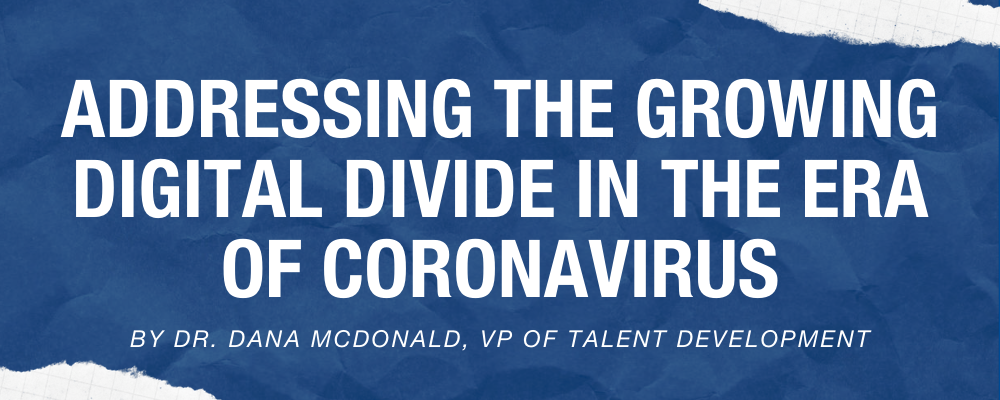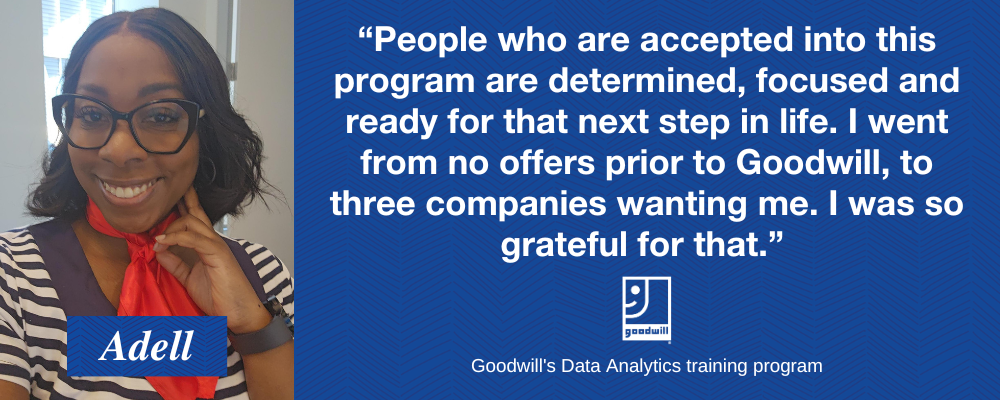How the COVID-19 pandemic impacts the digital divide and what can we do to address it.
By Dr. Dana McDonald, VP of Talent Development, Goodwill Industries of the Southern Piedmont
COVID-19 and the subsequent Stay-at-Home orders, working and schooling from home and social distancing have highlighted many of the disparities that exist in our world. The digital divide is yet another story of “haves and have nots.” It is the gulf between those who have access to devices and the internet, and those who do not, and today it’s affecting their ability to prosper more than ever before. Even if you have access to technology, access to reliable broadband internet impacts our quality of life in many areas — delivery of health care, education, access to information and, not least of all, employment and economic opportunity. The COVID-19 pandemic has made the digital divide a critical issue directly linked to finding, securing and maintaining a job – and quality of life.
Imagine your day and the challenges created when you do not have consistent, reliable, quality access to broadband internet or devices to use the internet. Just as there are “food deserts,” many of our neighbors are living in “broadband deserts.” According to Digital Charlotte, in 2017 almost 5,000 households in Mecklenburg County had no internet access at all or didn’t have the means to purchase it in the future. That’s nearly 20% of the county’s population. Unfortunately, these deserts are often in communities of color, and in areas that experience economic inequities such as income and education. Over the past three years, participant data suggests there is approximately a 35% chance that a person served by Goodwill will not have broadband internet access. This issue is not contained to rural areas, but also urban and suburban areas. Data from the Federal Communications Commission reveals that percentages of people and businesses in south Charlotte often have access to broadband at rates three times higher than the rest of the city.
At the most basic level, digital access is the “ticket” to the game called work. In fact, according to Digital Charlotte, 80 percent of job opportunities are posted exclusively online. Then in order to earn most jobs and to do the work, basic digital skills are needed. Digital skills are definitely required to advance to higher-paying jobs, often referred to as middle skill jobs. At Goodwill, we focus on helping people advance their careers and improve their circumstances. That’s why we offer digital skills training at all levels – from basic computer use to productivity skills like Microsoft Word or Excel, to advanced training that leads to IT-related careers.
Equitable access to technology and skills directly impacts equitable access to jobs and, in particular, jobs that can sustain a family. It’s important to note that COVID-19 did not cause issues around digital equity and job equity. But it has highlighted and exacerbated the gaps in our communities that people, especially people of color, are likely to slip through. With today’s “new normal” the digital divide has become a chasm that is nearly impossible for many to cross. “Stay at home” for many means “work from home,” which requires quality broadband access, a computer, and digital skills. For those without digital access or in jobs with lower digital requirements the alternatives include leaving home to work or losing your income because your employer has closed. These are decisions people are making daily that impact safety, public health and quality of life for entire families and communities.
Because of these difficult decisions, Goodwill is serving more than 1,000 people per week to provide access to basic needs, job search support and career training. But without access to quality broadband and internet-connected devices, all of our participants aren’t able to take advantage of career-enhancing digital skills training courses, research available community resources, or conduct thorough job searches.
Given the amplified issues we now face in the era of COVID-19, we must focus energy, resources and innovative thinking to find solutions that provide quality and affordable access to broadband and devices to all communities. We’re taking action to address the digital divide. Goodwill plans to provide laptops and WiFi hotspots to people we serve who need these devices to advance their careers and sustain their families – but we need your help. With the community’s support, we hope to raise enough funds to provide laptops and hotspots to give to people who are accessing our services to improve their careers and their lives. Can you help us close the gap? What action can you take to address the digital inequities in our community?








Join the Conversation